
24 February 2025
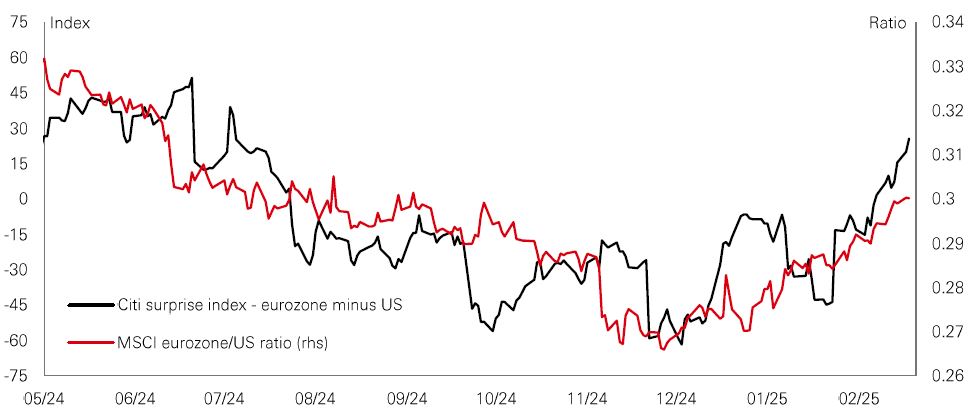
Eurozone equities have outperformed year-to-date with the MSCI index up by c.12% versus a c.4% gain in the S&P 500. The move is rooted in the low valuations seen late last year, with several factors recently starting to unlock this potential – upward revisions to analysts’ overly pessimistic 2025 earnings expectations, a weaker euro, upward surprises on eurozone growth data, improving sentiment towards China, and expectations for looser European fiscal policy.
However, eurozone stocks have risen a long way relatively quickly, so some near-term caution may be warranted. While data have surprised marginally to the upside, they have been against low expectations. Equally, optimism over fiscal easing hinges, partly, on the German election outcome and prospects for easing the German debt brake. Rule changes would require a two-thirds majority vote in the Bundestag, which is not a given.
The fiscally conservative CDU/CSU is leading in the polls and while its leader, Friedrich Merz, has signalled some possible flexibility on the debt brake regarding defence spending, he favours exploring expenditure restraint in other areas first. Moreover, while the centre-left SPD – a potential coalition partner – is open to some reform, if the CDU/CSU requires the support of the FDP, agreement on this issue could prove more difficult. Nonetheless, with eurozone equities trading at a larger than normal discount to the US, any positive European growth or policy surprises could further extend the recent outperformance.
Islamic finance – also known as Shariah-compliant finance – accounts for around 1% of global financial assets. Yet it’s a sector seeing rapid growth, delivering some strong recent performances, and potentially appealing to growing demand for socially-responsible investing.
Shariah-compliant assets are screened using principles commonly associated with Shariah law. They include areas like risk sharing, limiting unnecessary uncertainty, and the prohibition of interest. There is a strong emphasis on property rights and fair treatment of employers, employees, customers, and other stakeholders. The screening also excludes exposure to certain business sectors, and sets tolerance limits for certain types of investment income.
Although guided by different principles, Shariah screening has similarities with strategies that use environmental, social and governance factors. Both commit to promoting investments that minimise harm to society and uphold ethical conduct. They also tend to focus on stability and risk reduction. That makes them a useful diversification option for asset allocators. As for performance, some Shariah-compliant indices have been delivering strong returns, with the Dow Jones Islamic Market Titans 100 index outperforming the S&P 500 over three and five years.
The value of investments and any income from them can go down as well as up and investors may not get back the amount originally invested. Past performance does not predict future returns. For informational purposes only and should not be construed as a recommendation to invest in the specific country, product, strategy, sector, or security. Any views expressed were held at the time of preparation and are subject to change without notice. Any forecast, projection or target where provided is indicative only and is not guaranteed in any way. Source: HSBC Asset Management. Macrobond, Bloomberg. Data as at 7.30am UK time 24 February 2025.
The ECB has formally updated its estimate of the nominal neutral rate of interest, concluding it is in the range of 1.75% to 2.25%. Commonly referred to as r-star, or r*, the neutral rate is the interest rate that allows full employment and stable inflation over the medium term. Yet, while r* is an important benchmark, its unobservable nature makes its estimation difficult. The Bank of England noted recently that an ageing population, global trade disintegration, and higher global risks may be weighing on growth potential, and thus r*. Meanwhile, other factors, such as financial fragmentation, climate change, expansionary fiscal policy, and AI are creating upward pressure. The BoE opted not to give an estimate of the UK’s neutral rate. For the US, the FOMC’s estimated range is c.2.50%-4.00% with a median figure of 3.00% and rising. |
Lower estimates of the neutral rate in Europe, alongside a more sluggish economy, suggest a long duration positions in Europe. Still-robust growth in the US could imply the neutral rate there is higher than estimated.
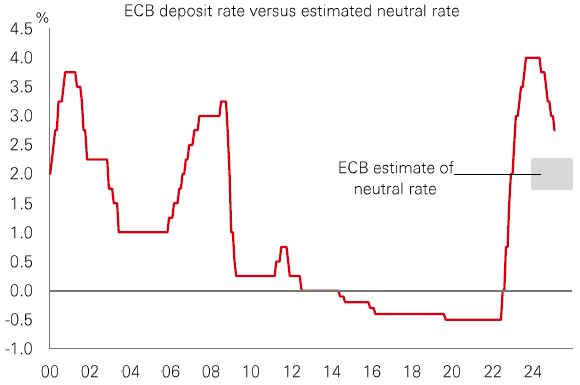
Japanese stocks have surprised to the upside in the current Q4 2024 earnings season. Most companies in the Topix index have now reported, and y-o-y earnings growth is about 13%. The industrials and consumer discretionary sectors have been the strongest, buoyed by high overseas exposure. Financials have also done well on higher net interest margins as the Bank of Japan gradually heads towards normalisation. The results have been helped by a tailwind of improving economic momentum, with Q4-24 GDP coming in stronger-than-expected. Government-led corporate governance reforms have also played a part, as are targeted budget stimulus, including inflation relief and support for industries like AI and semiconductors. |
In response, Japanese stocks have seen a pick-up in analyst earnings upgrades for the coming 12 months. Yet they trade at a discount to peers, with a forward 12-month price-earnings ratio of 15.3x, versus 22.6x in the US. They also trade on a relatively low price-to-book ratio of around 1.5x. Overall, the outlook for Japanese stocks remains positive, although exporters could face headwinds from global policy uncertainty.
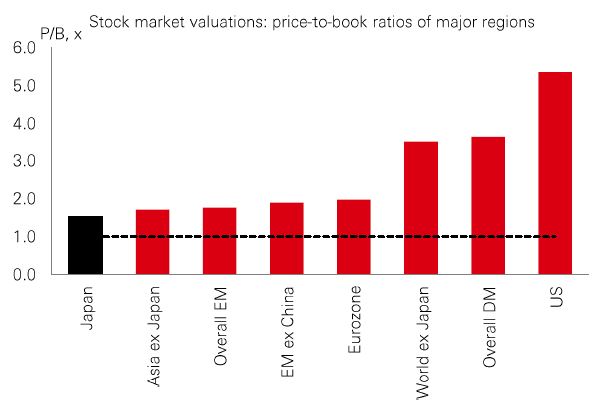
Is the recent US dollar rally looking tired? It is quite telling that an upside surprise for January US CPI did not lead to any material dollar outperformance. If anything, the modest gains were more than unwound following softer underlying details of the PPI print and a weak retail sales release. What we are seeing is that the dollar and US yields are not rising hard on strong US data but falling on any signs of softness. Global factors may also be limiting the dollar’s appreciation trajectory. China’s January credit data suggests a turning point may be at hand. Equally, strong wage and GDP data out of Japan and recent positive eurozone data surprises also lean in this direction. |
With the USD expensive on a historical basis and plenty of positives already priced in, any disappointing US-related developments, or positive non-US developments relative to pretty downbeat expectations, could start to weigh on the greenback.
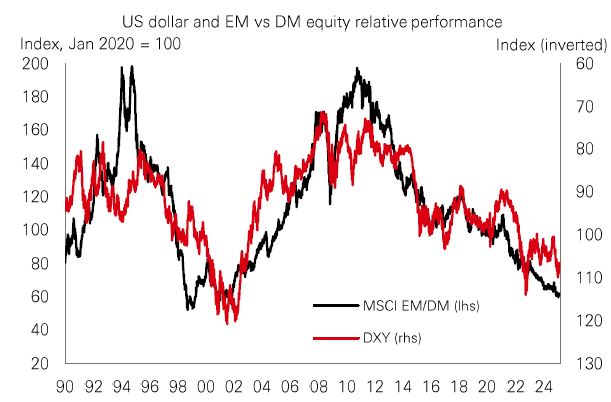
Past performance does not predict future returns. The level of yield is not guaranteed and may rise or fall in the future. For informational purposes only and should not be construed as a recommendation to invest in the specific country, product, strategy, sector, or security. Any views expressed were held at the time of preparation and are subject to change without notice. Any forecast, projection or target where provided is indicative only and is not guaranteed in any way. Index returns assume reinvestment of all distributions and do not reflect fees or expenses. Source: HSBC Asset Management. Macrobond, Bloomberg, Datastream. Data as at 7.30am UK time 24 February 2025.
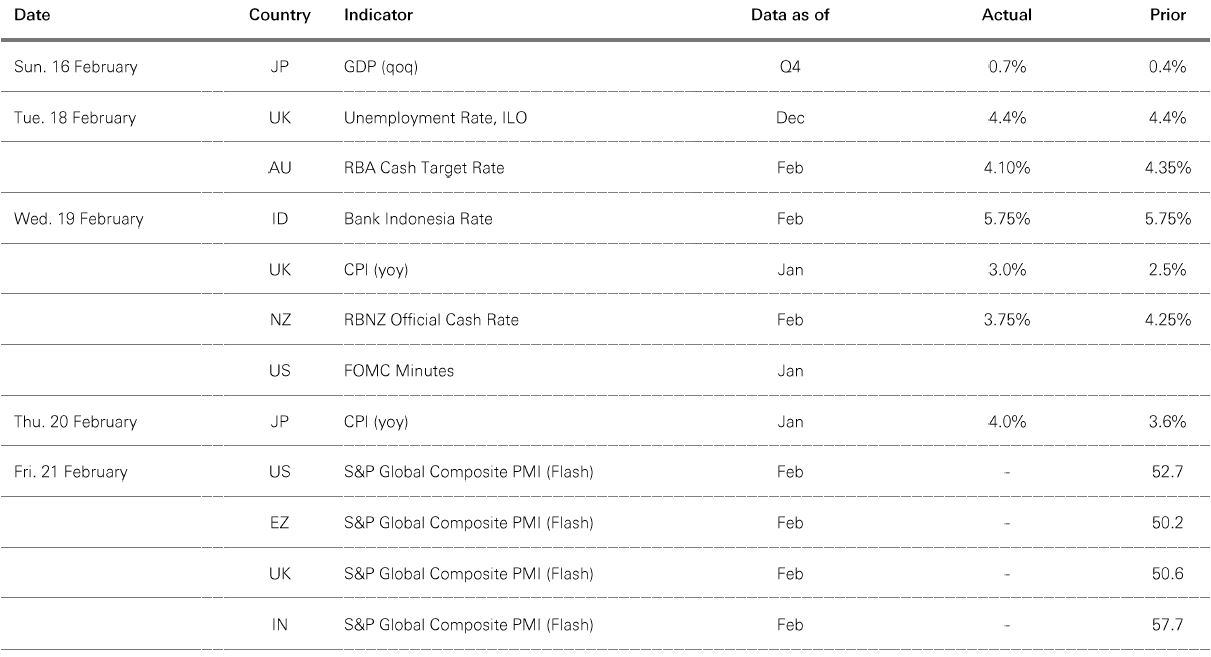
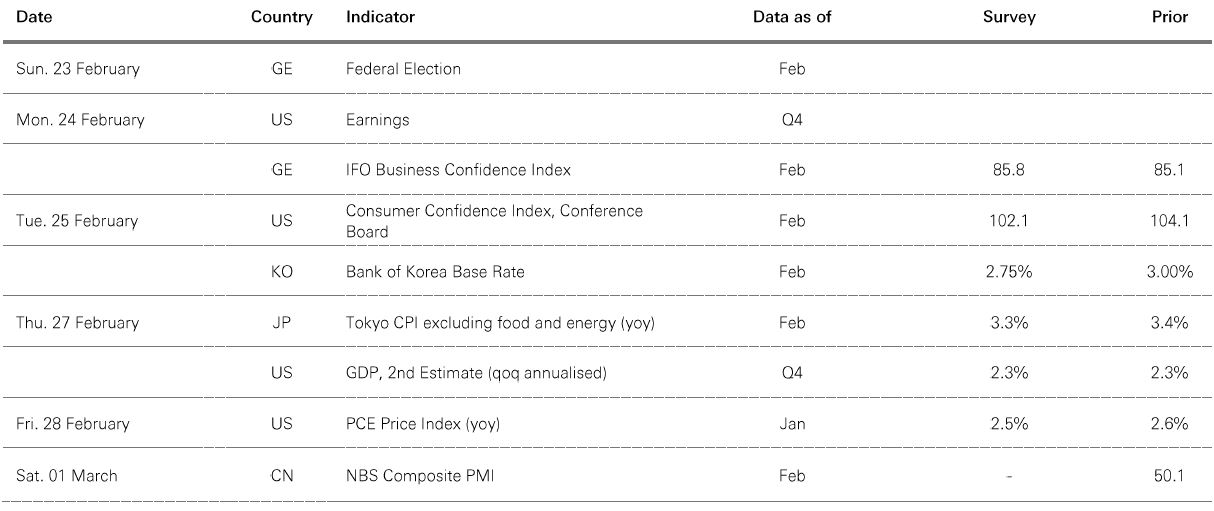
Source: HSBC Asset Management. Data as at 7.30am UK time 24 February 2025. For informational purposes only and should not be construed as a recommendation to invest in the specific country, product, strategy, sector or security. Any views expressed were held at the time of preparation and are subject to change without notice.
Risk markets remain resilient despite ongoing geopolitical tensions. The US dollar weakened against developed and EM currencies. Rising fiscal worries weighed on eurozone government bonds, and disappointing UK inflation data pressured Gilts. US Treasuries were range-bound ahead of core PCE figures, with January’s FOMC minutes reiterating the Fed is in no hurry to ease. In the US, the S&P 500 touched a fresh high mid-week, with the Nasdaq slipping on mixed Q4-24 earnings reports. The Euro Stoxx 50 paused for breath after recent gains, and Germany’s DAX was steady. Japan’s Nikkei 225 lost ground as a higher yen weighed on exporters amid a re-pricing of BoJ rate expectations. EM equities were mixed. South Korea’s Kospi index posted decent gains, the Shanghai Composite nudged higher, and the Hang Seng and India’s Sensex drifted lower. In commodities, oil and gold rose. Copper fell.






This document or video is prepared by The Hongkong and Shanghai Banking Corporation Limited (‘HBAP’), 1 Queen’s Road Central, Hong Kong. HBAP is incorporated in Hong Kong and is part of the HSBC Group. This document or video is distributed and/or made available, HSBC Bank (China) Company Limited, HSBC Bank (Singapore) Limited, HSBC Bank Middle East Limited (UAE), HSBC UK Bank Plc, HSBC Bank Malaysia Berhad (198401015221 (127776-V))/HSBC Amanah Malaysia Berhad (20080100642 1 (807705-X)), HSBC Bank (Taiwan) Limited, HSBC Bank plc, Jersey Branch, HSBC Bank plc, Guernsey Branch, HSBC Bank plc in the Isle of Man, HSBC Continental Europe, Greece, The Hongkong and Shanghai Banking Corporation Limited, India (HSBC India), HSBC Bank (Vietnam) Limited, PT Bank HSBC Indonesia (HBID), HSBC Bank (Uruguay) S.A. (HSBC Uruguay is authorised and oversought by Banco Central del Uruguay), HBAP Sri Lanka Branch, The Hongkong and Shanghai Banking Corporation Limited – Philippine Branch, HSBC Investment and Insurance Brokerage, Philippines Inc, and HSBC FinTech Services (Shanghai) Company Limited and HSBC Mexico, S.A. Multiple Banking Institution HSBC Financial Group (collectively, the “Distributors”) to their respective clients. This document or video is for general circulation and information purposes only.
The contents of this document or video may not be reproduced or further distributed to any person or entity, whether in whole or in part, for any purpose. This document or video must not be distributed in any jurisdiction where its distribution is unlawful. All non-authorised reproduction or use of this document or video will be the responsibility of the user and may lead to legal proceedings. The material contained in this document or video is for general information purposes only and does not constitute investment research or advice or a recommendation to buy or sell investments. Some of the statements contained in this document or video may be considered forward looking statements which provide current expectations or forecasts of future events. Such forward looking statements are not guarantees of future performance or events and involve risks and uncertainties. Actual results may differ materially from those described in such forward-looking statements as a result of various factors. HBAP and the Distributors do not undertake any obligation to update the forward-looking statements contained herein, or to update the reasons why actual results could differ from those projected in the forward-looking statements. This document or video has no contractual value and is not by any means intended as a solicitation, nor a recommendation for the purchase or sale of any financial instrument in any jurisdiction in which such an offer is not lawful. The views and opinions expressed are based on the HSBC Global Investment Committee at the time of preparation and are subject to change at any time. These views may not necessarily indicate HSBC Asset Management‘s current portfolios’ composition. Individual portfolios managed by HSBC Asset Management primarily reflect individual clients’ objectives, risk preferences, time horizon, and market liquidity.
The value of investments and the income from them can go down as well as up and investors may not get back the amount originally invested. Past performance contained in this document or video is not a reliable indicator of future performance whilst any forecasts, projections and simulations contained herein should not be relied upon as an indication of future results. Where overseas investments are held the rate of currency exchange may cause the value of such investments to go down as well as up. Investments in emerging markets are by their nature higher risk and potentially more volatile than those inherent in some established markets. Economies in emerging markets generally are heavily dependent upon international trade and, accordingly, have been and may continue to be affected adversely by trade barriers, exchange controls, managed adjustments in relative currency values and other protectionist measures imposed or negotiated by the countries with which they trade. These economies also have been and may continue to be affected adversely by economic conditions in the countries in which they trade. Investments are subject to market risks, read all investment related documents carefully.
This document or video provides a high-level overview of the recent economic environment and has been prepared for information purposes only. The views presented are those of HBAP and are based on HBAP’s global views and may not necessarily align with the Distributors’ local views. It has not been prepared in accordance with legal requirements designed to promote the independence of investment research and is not subject to any prohibition on dealing ahead of its dissemination. It is not intended to provide and should not be relied on for accounting, legal or tax advice. Before you make any investment decision, you may wish to consult an independent financial adviser. In the event that you choose not to seek advice from a financial adviser, you should carefully consider whether the investment product is suitable for you. You are advised to obtain appropriate professional advice where necessary.
The accuracy and/or completeness of any third-party information obtained from sources which we believe to be reliable might have not been independently verified, hence Customer must seek from several sources prior to making investment decision.
The following statement is only applicable to HSBC Mexico, S.A. Multiple Banking Institution HSBC Financial Group with regard to how the publication is distributed to its customers: This publication is distributed by Wealth Insights of HSBC México, and its objective is for informational purposes only and should not be interpreted as an offer or invitation to buy or sell any security related to financial instruments, investments or other financial product. This communication is not intended to contain an exhaustive description of the considerations that may be important in making a decision to make any change and/or modification to any product, and what is contained or reflected in this report does not constitute, and is not intended to constitute, nor should it be construed as advice, investment advice or a recommendation, offer or solicitation to buy or sell any service, product, security, merchandise, currency or any other asset.
Receiving parties should not consider this document as a substitute for their own judgment. The past performance of the securities or financial instruments mentioned herein is not necessarily indicative of future results. All information, as well as prices indicated, are subject to change without prior notice; Wealth Insights of HSBC Mexico is not obliged to update or keep it current or to give any notification in the event that the information presented here undergoes any update or change. The securities and investment products described herein may not be suitable for sale in all jurisdictions or may not be suitable for some categories of investors.
The information contained in this communication is derived from a variety of sources deemed reliable; however, its accuracy or completeness cannot be guaranteed. HSBC México will not be responsible for any loss or damage of any kind that may arise from transmission errors, inaccuracies, omissions, changes in market factors or conditions, or any other circumstance beyond the control of HSBC. Different HSBC legal entities may carry out distribution of Wealth Insights internationally in accordance with local regulatory requirements.
Important Information about the Hongkong and Shanghai Banking Corporation Limited, India (“HSBC India”)
HSBC India is a branch of The Hongkong and Shanghai Banking Corporation Limited. HSBC India is a distributor of mutual funds and referrer of investment products from third party entities registered and regulated in India. HSBC India does not distribute investment products to those persons who are either the citizens or residents of United States of America (USA), Canada or New Zealand or any other jurisdiction where such distribution would be contrary to law or regulation.
The following statement is only applicable to HSBC Bank (Taiwan) Limited with regard to how the publication is distributed to its customers: HSBC Bank (Taiwan) Limited (“the Bank”) shall fulfill the fiduciary duty act as a reasonable person once in exercising offering/conducting ordinary care in offering trust services/ business. However, the Bank disclaims any guarantee on the management or operation performance of the trust business.
The following statement is only applicable to PT Bank HSBC Indonesia (“HBID”): PT Bank HSBC Indonesia (“HBID”) is licensed and supervised by Indonesia Financial Services Authority (“OJK”). Customer must understand that historical performance does not guarantee future performance. Investment product that are offered in HBID is third party products, HBID is a selling agent for third party product such as Mutual Fund and Bonds. HBID and HSBC Group (HSBC Holdings Plc and its subsidiaries and associates company or any of its branches) does not guarantee the underlying investment, principal or return on customer investment. Investment in Mutual Funds and Bonds is not covered by the deposit insurance program of the Indonesian Deposit Insurance Corporation (LPS).
Important information on ESG and sustainable investing
Today we finance a number of industries that significantly contribute to greenhouse gas emissions. We have a strategy to help our customers to reduce their emissions and to reduce our own. For more information visit www.hsbc.com/sustainability.
In broad terms “ESG and sustainable investing” products include investment approaches or instruments which consider environmental, social, governance and/or other sustainability factors to varying degrees. Certain instruments we classify as sustainable may be in the process of changing to deliver sustainability outcomes. There is no guarantee that ESG and Sustainable investing products will produce returns similar to those which don’t consider these factors. ESG and Sustainable investing products may diverge from traditional market benchmarks. In addition, there is no standard definition of, or measurement criteria for, ESG and Sustainable investing or the impact of ESG and Sustainable investing products. ESG and Sustainable investing and related impact measurement criteria are (a) highly subjective and (b) may vary significantly across and within sectors.
HSBC may rely on measurement criteria devised and reported by third party providers or issuers. HSBC does not always conduct its own specific due diligence in relation to measurement criteria. There is no guarantee: (a) that the nature of the ESG / sustainability impact or measurement criteria of an investment will be aligned with any particular investor’s sustainability goals; or (b) that the stated level or target level of ESG / sustainability impact will be achieved. ESG and Sustainable investing is an evolving area and new regulations are being developed which will affect how investments can be categorised or labelled. An investment which is considered to fulfil sustainable criteria today may not meet those criteria at some point in the future.
THE CONTENTS OF THIS DOCUMENT OR VIDEO HAVE NOT BEEN REVIEWED BY ANY REGULATORY AUTHORITY IN HONG KONG OR ANY OTHER JURISDICTION. YOU ARE ADVISED TO EXERCISE CAUTION IN RELATION TO THE INVESTMENT AND THIS DOCUMENT OR VIDEO. IF YOU ARE IN DOUBT ABOUT ANY OF THE CONTENTS OF THIS DOCUMENT OR VIDEO, YOU SHOULD OBTAIN INDEPENDENT PROFESSIONAL ADVICE.
© Copyright 2025. The Hongkong and Shanghai Banking Corporation Limited, ALL RIGHTS RESERVED.
No part of this document or video may be reproduced, stored in a retrieval system, or transmitted, on any form or by any means, electronic, mechanical, photocopying, recording or otherwise, without the prior written permission of The Hongkong and Shanghai Banking Corporation Limited.